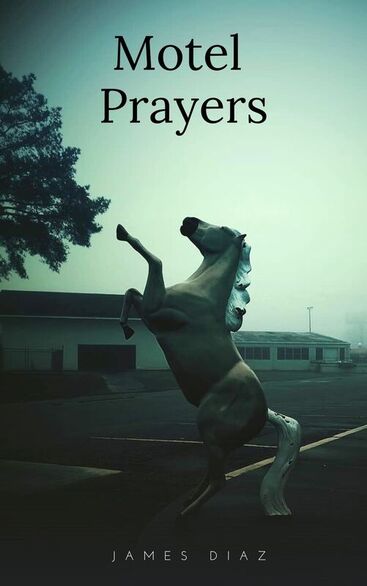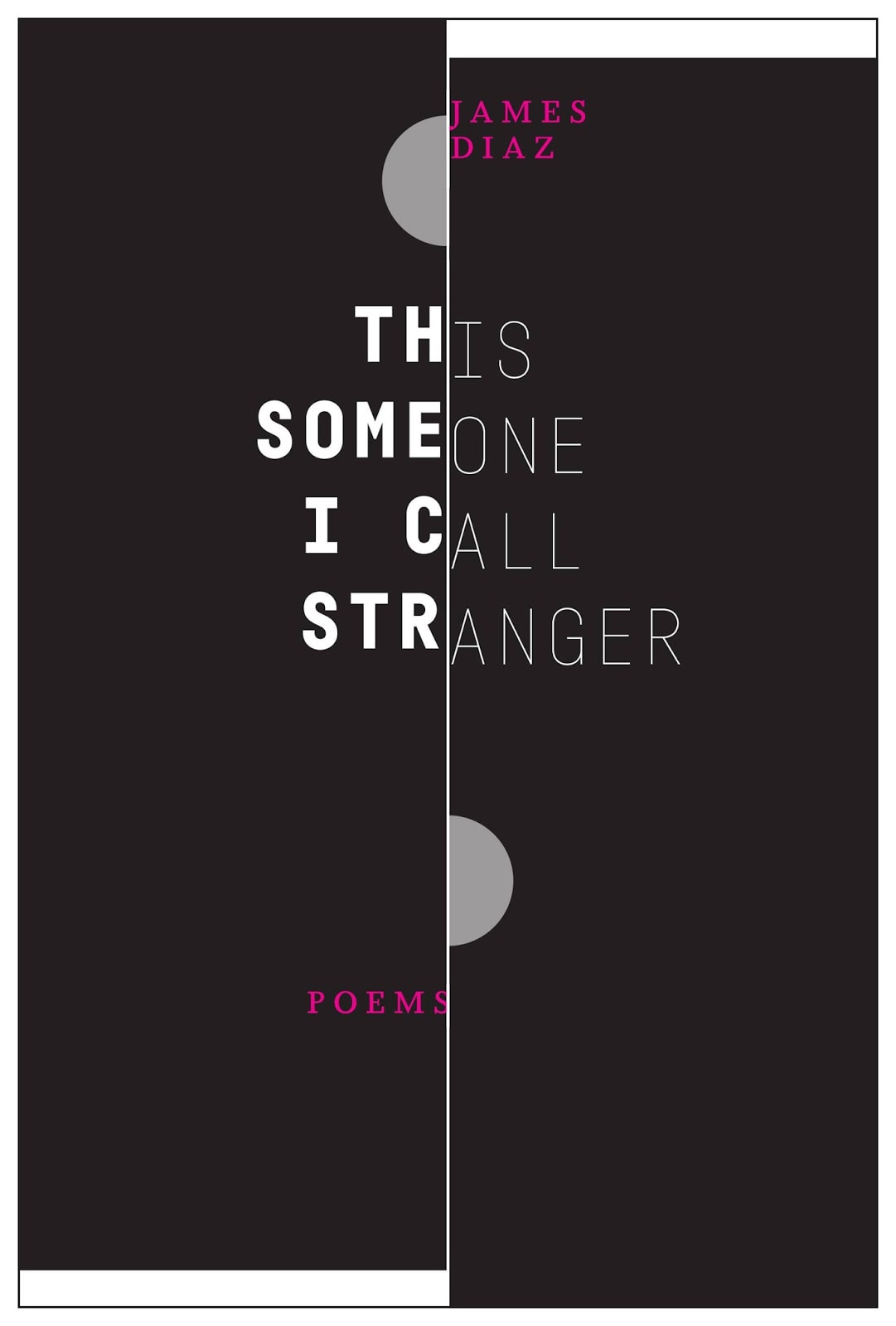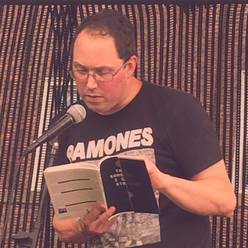James Coleman
About Me
James Diaz is the author of This Someone I Call Stranger (2018) Indolent Books, All Things Beautiful Are Bent (Alien Buddha, 2021) Motel Prayers (Alien Buddha, 2022) and Editor of the Anthology; What Keeps Us Here: Songs from The Other Side of Trauma. In 2016 they founded the online literary arts and music journal Anti-Heroin Chic to provide a platform for often unheard voices, including those struggling with addiction, mental illness and prison/confinement. They are a three time best of the net nominee. Their work has appeared in numerous online and print magazines including Wrongdoing Magazine, The Madrigal, Cleaver Magazine, Gone Lawn, Rust + Moth, Thrush, Cobra Milk Mag, The Collidescope, Trampset, Yes, Poetry and HIV Here & Now. They have performed their poetry at Pete's Candy Store in Williamsburg Brooklyn in 2017, The Lunar Walk Poetry Series (East Village), A Novel Idea on Passyunk (Philli, PA), Bryant Park Reading Room, The Bowery Poetry Club and at the 2018 NYC Poetry Festival on Governors Island. They reside in upstate New York, in between balanced rocks and horse farms. They have never believed in anything as strongly as they do the power of poetry to help heal a shattered life.
In service, grace and gratitude.
In service, grace and gratitude.
My WorkJames Diaz's debut book of poetry, This Someone I Call Stranger is available for purchase from Indolent Books.
Diaz edits Anti-Heroin Chic
Diaz's newest collection of poems, All Things Beautiful Are Bent (Alien Buddha Press, 2021) is available from Amazon. |

Diaz's third full length collection, Motel Prayers, is available now on Amazon from Alien Buddha Press.
"There are books that change the way we perceive the world and there are books that change how we see ourselves. Motel Prayers does both. Motel Prayers is for the addict and those who have prayed for the addict, the reader who has ground their “heart down to a nub” and lives daily with “the avalanche of aching,” the one who doesn’t give up searching for “the light no longer on at the end of the hall.” These poems breathe in darkness, breathe out hope. They encase us in desperation while reminding us that we are, always, capable of light." -Joan Glass, author of If Rust Can Grow on the Moon
"There are books that change the way we perceive the world and there are books that change how we see ourselves. Motel Prayers does both. Motel Prayers is for the addict and those who have prayed for the addict, the reader who has ground their “heart down to a nub” and lives daily with “the avalanche of aching,” the one who doesn’t give up searching for “the light no longer on at the end of the hall.” These poems breathe in darkness, breathe out hope. They encase us in desperation while reminding us that we are, always, capable of light." -Joan Glass, author of If Rust Can Grow on the Moon
Testimonials
|
"Authentic, unafraid, and unassuming, James Diaz’s This Someone I Call Stranger is a personal yet dynamic landscape of the darker parts of the soul, which somehow remains “impossibly alive” no matter how far from home one has strayed. The poems are equal parts vulnerable and strong, a breathing example of how those qualities are inextricable, how there is something about the darkness that cannot put out the light, how there is something about the light that gains its brightness from the shadows. Diaz writes as if no one outside is listening, which is to say, as if these poems are not poems at all but whispered murmurs from one aspect of the self to another, and we the readers just happen to be lucky enough to catch these glimpses of humanity in its most raw essence: determined yet mysterious, messy yet transcendent."
-Sarah Certa (Nothing To Do With Me) *** "Poems may come to mean a lot to the reader but what do they mean to the poet? At what cost were they written? Diaz lets us know these things firsthand, bloody-fisted; he doesn’t stand apart at a cool, impersonal distance. “how short the time of innocence is” he observes heart-breakingly in Color-Coordinated Pencil Box. James Diaz has made art out of his life, created a soundtrack to his own fragmented world that, really, is not so unfamiliar (certainly not to me). Set the record needle on This Someone I Call Stranger — and listen." -Tricia Marcella Cimera (The Sea and A River) *** "In our era of irony, disposability, and impatience, the poems of This Someone I Call Stranger, James Diaz’s debut collection, reverberate with rare authenticity and lyrical pain. Threading through a past of blind forests and dark basements, empty cupboards, dirty needles, hospital floors, and bad men who won’t die, this book is a necessary example of duende for the twenty-first century. These poems will arrest you. They have hungry souls, and they ache without breaking. They will hang in your brain and settle in your bones, and they will also move you forward, bravely, toward uncertain light." Jessie Janeshek (The Shaky Phase) *** "James Diaz’s poetry collection, This Someone I Call Stranger, captures seasons. He shows you winters made, not of snow but, of heat. He warps love into sunbeams, and explains sorrow through logic and defeat. There is discordance and simplicity in these pages. Anarchy, and a warmth conjured by so many ghosts. His humaneness is palpable and oozing like an open wound... Through the journey of these poems his vision is a pilgrimage. An honest look into one’s psyche, and the regurgitation of oneself. Making a body of what had undergone a vivisection." Ingrid Calderon (Things Outside) *** "For all of its prickles, This Someone I Call Stranger is still a letting go; a down-pouring of emotion, a pre-echo of release. To give syntax to such pain requires profound courage, and courage too is required of the reader of this collection. James Diaz's poetry is not for the faint of heart, and one should not go in expecting the resolution of a fairytale ending. For those who can stare suffering straight in the eye while learning to process this sadness, to let it go, or at least, to let it transform into a picture of resilience, hope and communal strength, his work is both cathartic and deeply beautiful." -Jon Anatman *** |
There is no way to know / The weight of what you carry / Until you set it down reflects James Diaz in his heartachingly compassionate collection Motel Prayers. Surrounded by pain since early childhood – a drug-addicted father, a mother crippled by mental illness, brothers who shared the physical and emotional poverty of a Section 8 household only to grow up to be similarly broken – the narrator of these poems suffers indignity, incarceration, institutionalization, addiction…and then he set it down. And just as Diaz promises a field rots / and then it blooms, the narrator turns to lifting others from the hell of hopelessness, offering the promise that new bones sprout like prayers from dying gardens to his brothers, father, friends, even a stranger he meets on the way to a Twelve Steps meeting. To all who suffer, ache, feel less than human, less than enough, Diaz tenders this selfless proposal: “…and the avalanche of aching / where do you put that?” / in the palm of my hands / I hear myself saying. With empaths like Diaz in our troubled world, we all come to realize how beautiful it is to be alive – despite everything / and everyone / you had to give up / along the way.
-B. Fulton Jennes, author of Blinded Birds
-B. Fulton Jennes, author of Blinded Birds







